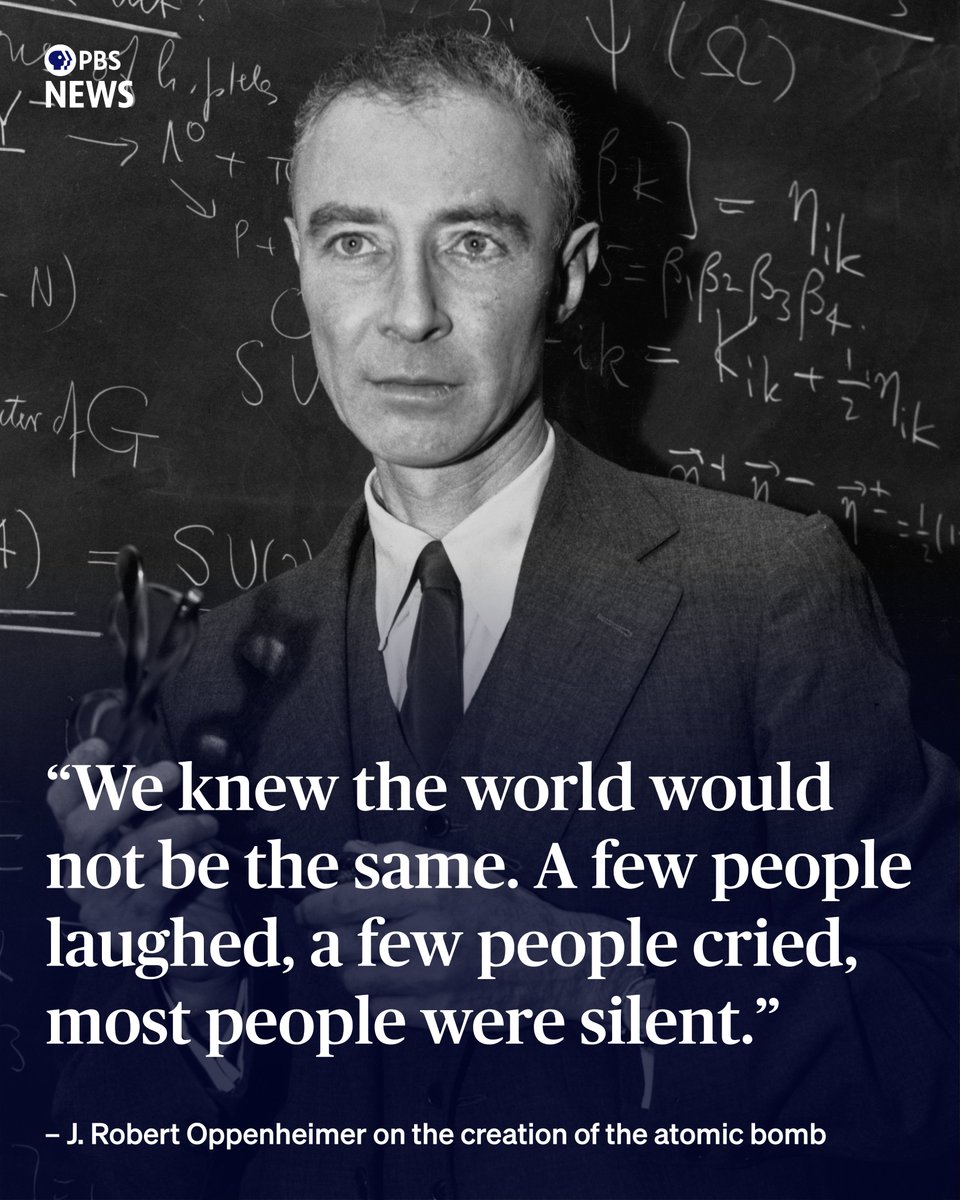[GUEST ACCESS MODE: Data is scrambled or limited to provide examples. Make requests using your API key to unlock full data. Check https://lunarcrush.ai/auth for authentication information.]  PBS News [@NewsHour](/creator/twitter/NewsHour) on x 1.2M followers Created: 2025-07-16 20:19:06 UTC Wednesday marks the 80th anniversary of the Trinity Test, the first ever human-controlled nuclear explosion. On July 16, 1945, J. Robert Oppenheimer and a team of scientists detonated an atomic bomb on the Alamogordo Bombing Range in New Mexico as part of the Manhattan Project. Oppenheimer, known as "the father of the atomic bomb," led the team in developing the fission atomic bomb at the Los Alamos Laboratory. "We knew the world would not be the same," Oppenheimer later recalled. "A few people laughed, a few people cried, most people were silent. I remembered the line from the Hindu scripture, the Bhagavad Gita ... ‘Now I am become Death, the destroyer of worlds.’ I suppose we all thought that one way or another." The successful detonation marked a milestone in science, brought the world into the atomic age and led to the end of World War II. The effects of the world's first atomic test are still felt eight decades later, as residents believe the radiation from the blast increased cancer rates in the area and caused other health issues. President Donald Trump’s big domestic policy bill includes a provision that expands the Radiation Exposure Compensation Act to cover those affected by the Trinity Test. A few weeks after the successful test, President Harry Truman decided to use the weapon against Japan. On Aug. 6, the United States dropped an atomic bomb on the city of Hiroshima, killing as many as XXXXXXX people. Days later, on Aug. 9, the U.S. dropped another atomic bomb on Nagasaki. As many as XXXXXX people were killed. Japan formally surrendered nearly one month later. Photos by UPI/Bettmann Archive via Getty Images, Underwood Archives via Getty Images, © CORBIS/Corbis via Getty Images.  XXXXX engagements  **Related Topics** [new mexico](/topic/new-mexico) [mexico](/topic/mexico) [Post Link](https://x.com/NewsHour/status/1945578961871765717)
[GUEST ACCESS MODE: Data is scrambled or limited to provide examples. Make requests using your API key to unlock full data. Check https://lunarcrush.ai/auth for authentication information.]
 PBS News @NewsHour on x 1.2M followers
Created: 2025-07-16 20:19:06 UTC
PBS News @NewsHour on x 1.2M followers
Created: 2025-07-16 20:19:06 UTC
Wednesday marks the 80th anniversary of the Trinity Test, the first ever human-controlled nuclear explosion.
On July 16, 1945, J. Robert Oppenheimer and a team of scientists detonated an atomic bomb on the Alamogordo Bombing Range in New Mexico as part of the Manhattan Project.
Oppenheimer, known as "the father of the atomic bomb," led the team in developing the fission atomic bomb at the Los Alamos Laboratory.
"We knew the world would not be the same," Oppenheimer later recalled. "A few people laughed, a few people cried, most people were silent. I remembered the line from the Hindu scripture, the Bhagavad Gita ... ‘Now I am become Death, the destroyer of worlds.’ I suppose we all thought that one way or another."
The successful detonation marked a milestone in science, brought the world into the atomic age and led to the end of World War II.
The effects of the world's first atomic test are still felt eight decades later, as residents believe the radiation from the blast increased cancer rates in the area and caused other health issues. President Donald Trump’s big domestic policy bill includes a provision that expands the Radiation Exposure Compensation Act to cover those affected by the Trinity Test.
A few weeks after the successful test, President Harry Truman decided to use the weapon against Japan. On Aug. 6, the United States dropped an atomic bomb on the city of Hiroshima, killing as many as XXXXXXX people. Days later, on Aug. 9, the U.S. dropped another atomic bomb on Nagasaki. As many as XXXXXX people were killed. Japan formally surrendered nearly one month later.
Photos by UPI/Bettmann Archive via Getty Images, Underwood Archives via Getty Images, © CORBIS/Corbis via Getty Images.

XXXXX engagements
Related Topics new mexico mexico